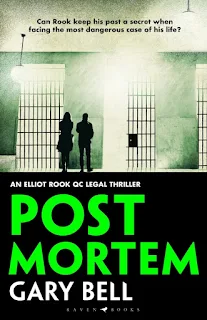INTRO
Post Mortem is the second in the series by Gary Bell featuring Barrister Elliot Rook QC, a character with a secret criminal past. Guest reviewer Neil Béchervaise shares his review below.NEIL'S REVIEW
The central character in Gary Bell’s second novel has apparently moved from convicted fraudster through homeless student sleeping rough to barrister and QC in the inner court chambers of a respected London legal firm. The publisher’s blurb suggests that knowledge of this background would destroy his career. As a lay reader, I would have thought so too; I would have thought he could never get so far. In fact, while this may provide an interesting backstory to an otherwise fairly plausible tale of corruption, drug-peddling and murder within the prison system and Wormwood Scrubs in particular, it does push the limits.In equally dubious fashion, ‘pupil’ lawyer Zara’s desperate quest for recognition and acceptance into the same legal firm ahead of apparently numerous similarly qualified and ambitious young ‘pupils’ suggests that the author may be trying too hard. In the only real elaboration of her character, Zara is described on Page 20 as “a gay woman of mixed race with a council-estate background and thick Nottinghamshire accent” – an unlikely recruit to a leading London law firm? Fortunately, the real story lies in the solution of ‘the crime’.
Rook’s early encounter with a kennel-full of killer dogs being trained for illegal dog-fights leads to his saving a particularly cruelly treated ‘bait dog’ and encountering an especially large, white, rare and savage breed, dogo argentinos, illegal in the UK but being trained, here, for ‘special customers’.
When the image of a large white dog appears behind the front door of Rook’s latest client, Charli, charged with smuggling illegal drugs into the prison where she works, the basis for the plot is established. Before she has even been arrested, however, 13 prison inmates have been murdered. But how are the offences connected?
As Rook and Zara collaborate to bring related cases to court, Bell’s capacity to inter-relate complex legal points with a compelling storyline offers fascinating insights into the evolution of the criminal gang in Britain. From the territorial protection of inner-city slums to the evolution of racially based criminal gangs promoted through massive housing projects, Post Mortem offers insights into the manipulation of the poorer classes. At the same time, it identifies the legal and humanitarian issues arising from overcrowding and unemployment among those groups who have been ‘left behind’ across a shift in social and economic needs since the industrial revolution.
The ultimate overlap between criminal and judicial power presented in Bell’s denouement, while perhaps a little too convenient, presents his readers with a fascinating picture of the entrenched issues of class, race and social necessity in Britain in the twenty-first century. Public housing may reduce homelessness but it does not, it seems, address the fundamental issue of purpose in life, regardless of the country it is focused within.
Bell’s Post Mortem has its problems with character and plot plausibility but the thematic issues it raises and the range of action it presents between crime and justice make it an interesting read.



































